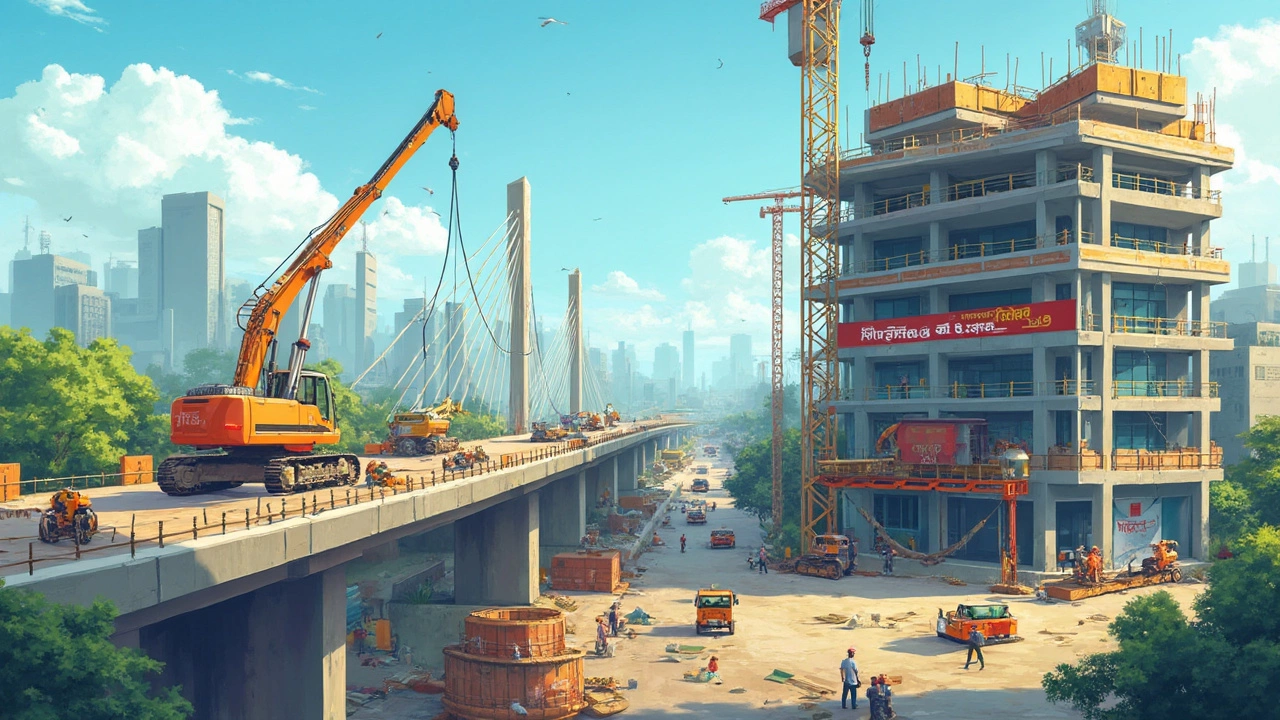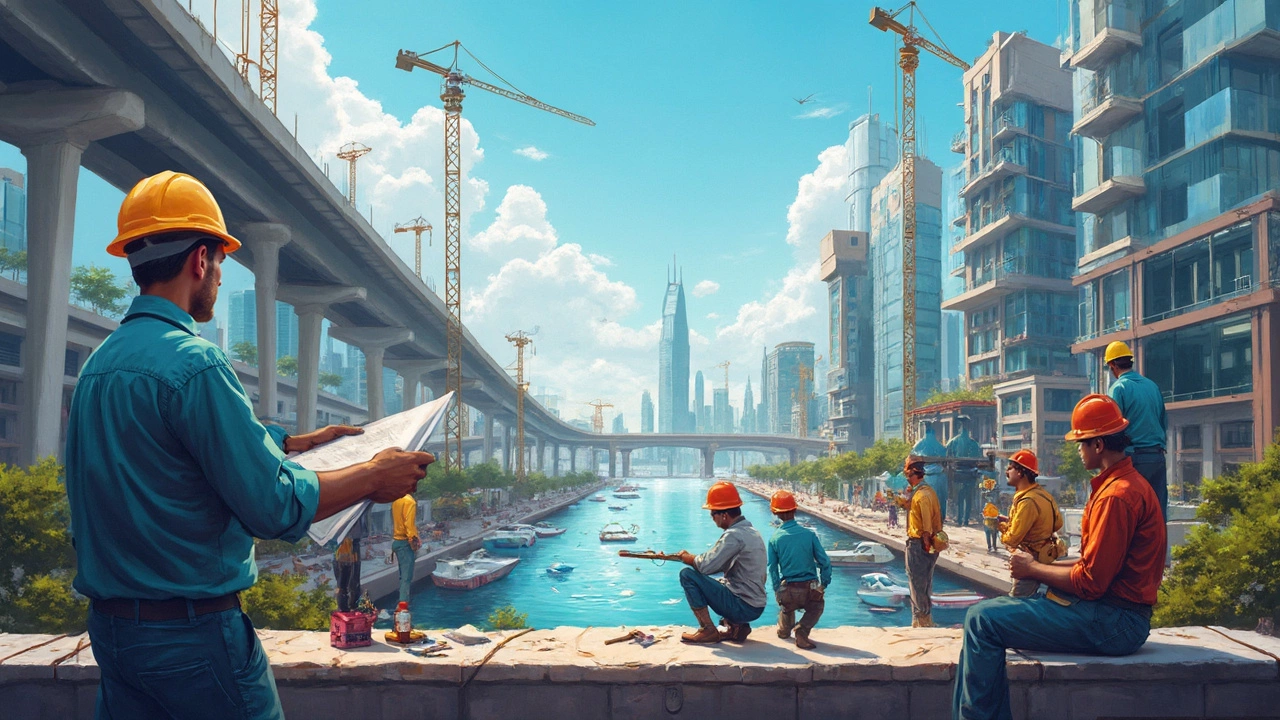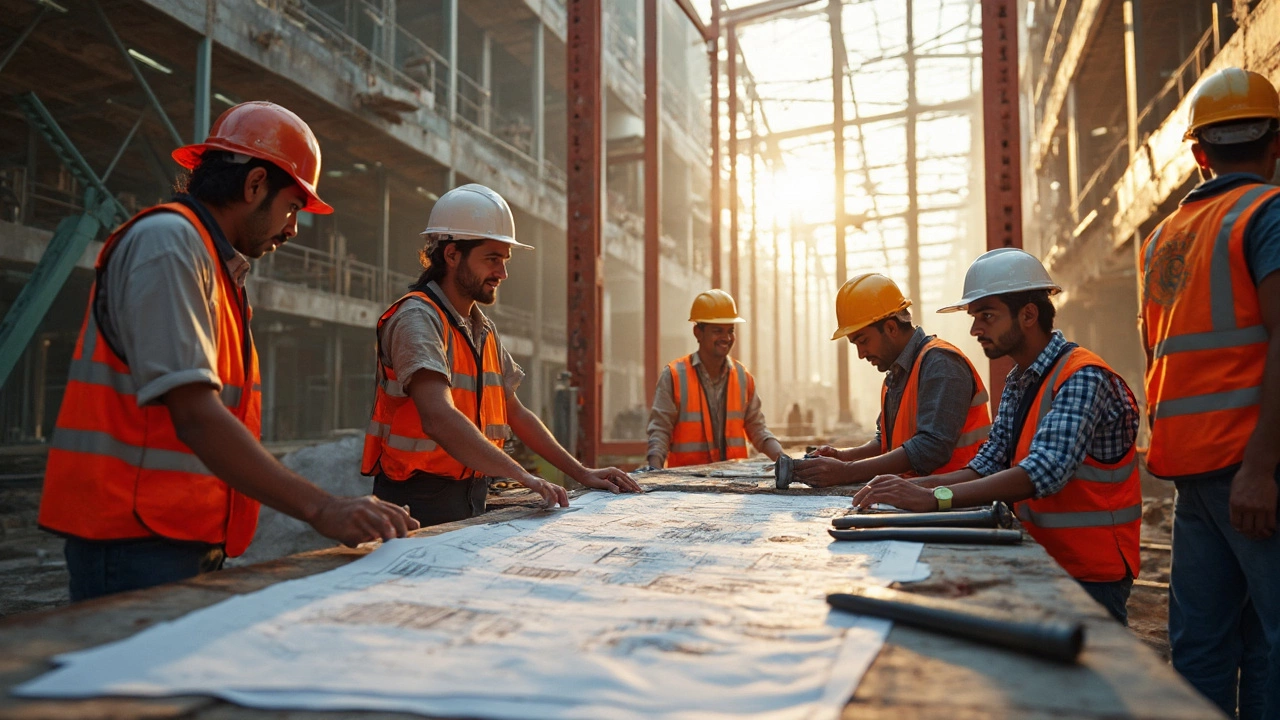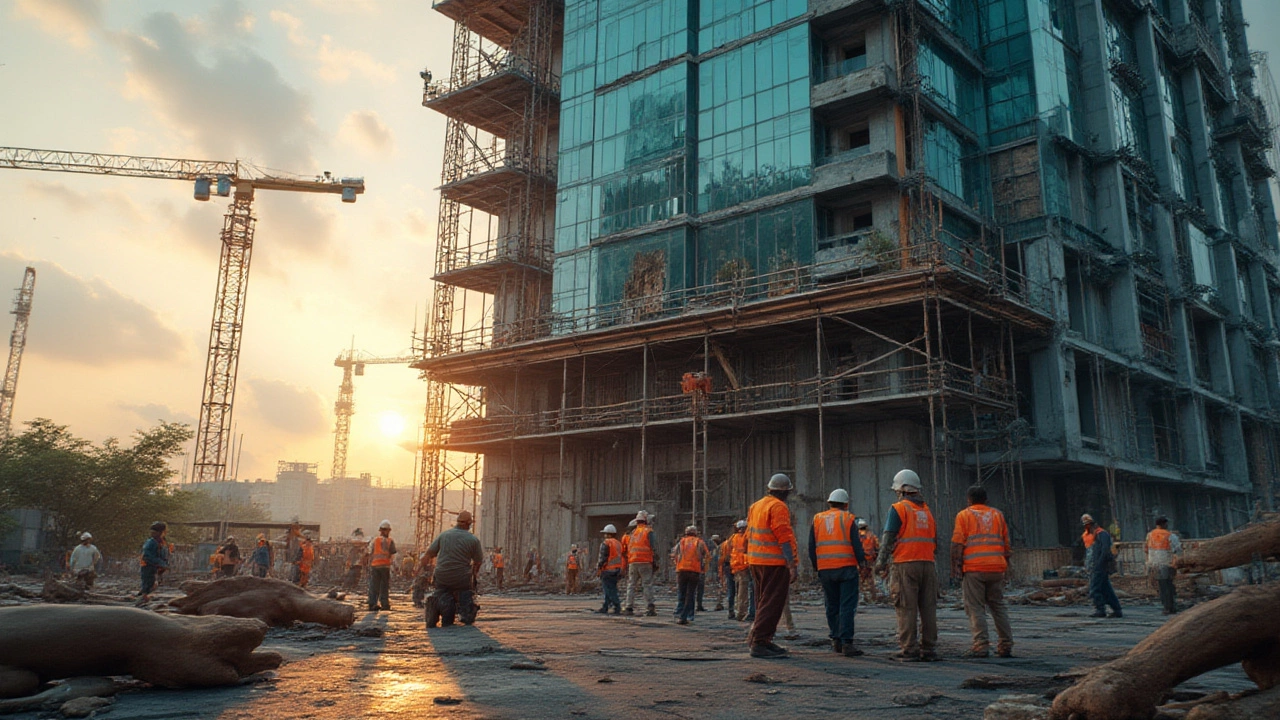Ever wondered why some builders talk about laying down highways while others focus on malls and office towers? Civil and commercial construction aren't just jargon—these terms decide what gets built and who does the work. If you’re looking at putting up a new building or even just trying to make sense of contractor proposals, knowing the line between civil and commercial work can save you a ton of time and money.
Civil construction sounds like it should cover everything, but that’s not the case. Civil projects stick to public infrastructure—think highways, airports, water pipes, and bridges. Commercial construction, on the other hand, zeros in on private business spaces. We’re talking about hotels, shopping centers, and even a regular office building downtown.
- What Does Civil Construction Actually Mean?
- What Sets Commercial Construction Apart?
- Why the Confusion Happens (and Real-World Consequences)
- How to Choose the Right Contractor for Your Project
What Does Civil Construction Actually Mean?
Civil construction is the backbone of the environments we move through every day. If you’ve driven over a bridge, walked through a city park, or used running water, you’ve experienced what civil construction does. Unlike other types of civil construction, this part of the industry doesn’t deal with places where people work or shop—it’s about spaces and systems we all use as a community.
We're talking roads, railways, airports, tunnels, water treatment plants, and even dams. These projects are huge, usually funded by the government, and often take years from planning to finish. Fun fact: The American Society of Civil Engineers reported that the U.S. needs to invest roughly $2.6 trillion by 2029 just to get its infrastructure up to basic standards. That covers fixing old bridges, water systems, ports, and a lot more.
"Civil construction shapes the world by making public goods possible—safe drinking water, reliable highways, and resilient bridges all rely on expert design and construction." — American Society of Civil Engineers
The people who lead these projects are called civil engineers, and they work with lots of rules and safety codes. Their goal? Build stuff that lasts and keeps everyone safe. Materials range from steel and concrete to dirt and gravel (think about the next time you pass a construction site and see those giant piles of rocks).
| Common Civil Construction Projects | Typical Client | Main Materials |
|---|---|---|
| Highways | Government/State | Asphalt, Concrete, Steel |
| Bridges | Government/City | Steel, Concrete, Cables |
| Wastewater Plants | Local Authority | Reinforced Concrete, Pipes, Valves |
| Airports | Federal/Municipal | Concrete, Structural Steel |
If you spot heavy machinery carving out massive land areas or pouring concrete for a drainage system, that’s straight-up civil construction in action. The work is out in the open and usually messy. Permits and inspections are a big deal—mistakes can mean streets flood or bridges collapse, so there’s not much room for shortcuts.
So next time you’re stuck in traffic because of roadwork, remember, that’s civil construction making sure your daily commute, water supply, and even your power lines will keep working for years down the road.
What Sets Commercial Construction Apart?
Most people picture cranes, steel beams, and big glass windows when they hear "commercial construction." That’s not far off the mark. What really makes commercial work stand out is the focus on buildings meant for business, not public service. So, a massive hotel, that new fast food place down the street, or a shopping strip—all these count as commercial projects. The big goal? Make spaces where people work, sell, eat, or shop.
Unlike civil jobs that have to last through floods or earthquakes, commercial projects have to follow rules that change a lot depending on who’s going to be using the building. For example, a grocery store’s open layout isn’t anything like a hospital full of private rooms and special equipment. Codes for fire safety, parking, accessibility, and sometimes even indoor air quality can be different from one project to the next.
Here’s a trick: if the finished structure is expected to turn a profit or house a business, it’s usually commercial. Builders in this field get used to flipping through long contracts, tight deadlines, and ever-changing plans as business owners tweak their needs last minute. Plus, commercial construction often calls for higher-end finishes or branded designs so companies can stand out when customers walk in.
Check out some quick data that show just how much commercial construction matters in the real world:
| Project Type | Avg. US Annual Spending (2024) |
|---|---|
| Commercial (offices, retail, hospitality) | $132 billion |
| Institutional (hospitals, schools) | $110 billion |
| Industrial/Manufacturing | $91 billion |
When you’re dealing with commercial construction, keep these things in mind:
- Always confirm your contractor has real experience in the type of space you need—they might be great at offices but clueless about kitchens or labs.
- Ask for details about city permits, since these projects often need lots of upfront sign-offs.
- Plan for changes on the fly; commercial jobs almost never go exactly as planned, especially if branding or tech requirements are involved.
- If you’re renting out space, you’ll need to work with both the builder and future tenants to make the plans work for everyone.
So, next time you see a crane going up outside a crowded downtown boulevard, remember—it’s likely a commercial project making another spot for business to boom.

Why the Confusion Happens (and Real-World Consequences)
It’s easy to mix up civil and commercial construction because, on the surface, both sound like they’re about big building projects. The word “civil” feels like it should mean ‘anything built by people,’ right? But that’s not how the industry splits things up. The trouble usually starts when people don’t get how specific these labels actually are.
The confusion goes up a notch when you consider that the same construction company can work on both types of projects if they’ve got the right crew and experience. Some local contractors blur the lines, taking on both commercial and civil jobs under one roof. Even city planners sometimes slip up in paperwork, using ‘commercial’ as a catch-all. According to a 2023 industry survey, about 28% of construction clients admitted they weren’t totally clear on the two terms—leading to mix-ups when hiring or applying for permits.
The impact isn’t just a headache for paperwork. Getting this wrong can mean huge problems, like:
- Civil construction projects need different permits and safety checks than commercial builds. Mixing these up can trap your project in red tape for months.
- Budgeting goes sideways if your contractor is prepping for building a shopping mall, but you’re really planning a bridge repair. These aren’t apples-to-apples costs.
- Insurance coverage gets tricky. Policies for public infrastructure work are not the same as those for private businesses. You could end up underinsured or paying more than you need to.
Check out this table for some real-life consequences of confusion in the last two years:
| Scenario | Consequence | Reported Cost or Delay |
|---|---|---|
| Misfiled permit (civil vs. commercial) | Project halted for re-approval | Up to 4 months lost |
| Wrong insurance policy for project type | Denied claim after accident | $120,000 in uncovered repair costs |
| Mismatched contractor experience | Poor workmanship on civil road work | $75,000 in rework required |
The bottom line is this: the difference matters. Getting clear on civil versus commercial isn’t just industry nitpicking. It can decide whether your project gets built right, on time, and within budget—or spirals into a mess of delays and surprise costs.
How to Choose the Right Contractor for Your Project
If you’re picking a contractor for a civil or commercial job, remember—these aren’t interchangeable skills. Someone who’s a rockstar at pouring concrete for highways might not have a clue how to handle office HVAC systems or local code for shopping centers.
Start by figuring out exactly what your project falls under. Is it a new stretch of roadway or a city water line? Stick with civil construction specialists. Need a movie theater built or an apartment tower? You want commercial pros. Easy to say, but how do you know for sure you’ve got the right team? Here’s a breakdown to help you spot the difference and make the smart call:
- Check Licenses and Certifications: Civil work usually needs a different set of state or city licenses compared to commercial builders. Ask for proof. Real pros show you documents up front.
- Look for Project Experience: Always ask for a list of past jobs—don’t just read a website bio. Building a bridge is a different beast from putting up a retail plaza.
- Understand Insurance Requirements: Civil projects often need larger coverage (some states require $5 million+ for public works). For commercial, you still want at least $1-$2 million in liability, especially if your property will have foot traffic.
- Review Safety Records: The best contractors are happy to talk about OSHA ratings and their track record. If they dodge the question, that’s a major red flag.
- Interview Their Core Team: Ask to meet the site manager or foreman. Someone who’s actually run similar builds is gold. You want straightforward answers, not rehearsed marketing lines.
Here’s a quick look at how civil and commercial contractor requirements stack up, based on industry stats from late 2024:
| Feature | Civil Contractor | Commercial Contractor |
|---|---|---|
| Project Value (typical) | $10M - $250M | $1M - $50M |
| Insurance Coverage (min.) | $5,000,000 | $1,000,000 |
| Common Specialties | Highways, Bridges, Utilities | Retail, Offices, Hotels |
| Government Oversight | High—lots of inspections | Variable—depends on use |
Never skip references. Call at least two people who’ve hired the contractor for a similar job. If a builder drags their feet or gives you excuses, walk away. Time wasted now means bigger headaches—and costs—down the road.



